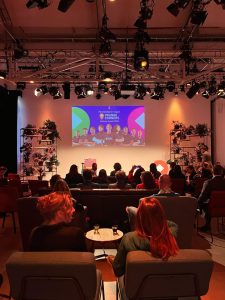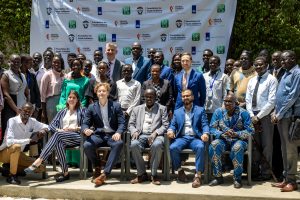343 entrepreneurs across 5 regions: Orange Corners Ghana‘s 7th cohort is one for the history books. Implemented by MDF West Africa, 166 young entrepreneurs are trained in Accra, 59 in Kumasi, 41 in Tamale, 36 in Ho and 41 in Takoradi.
In true Orange Corners fashion, ambitious Ghanaian entrepreneurs are equipped with the necessary knowledge, skills, access to markets and capital – all tailored to the Ghanaian context. During the 6-month acceleration programme, participants are taking part in 10 workshop days, several (online) masterclasses and individual coaching sessions. And of course, they also have the possibility to win an Orange Corners Innovation Fund grant, to scale their business even further after the 6-month acceleration programme ends.
In Ghana, Orange Corners is supported by private sector partners Fidelity Bank, Emergent Payments, Friesland Campina, Vivo Energy Ghana and Meridian Port Services (MPS). Starting this year, the programme has received additional private sector support from De Heus Koudijs and Cargill, raising the institutional support from 5 to 7 companies.
About the new partners
De Heus Koudijs: a family owned, 4th generation animal nutrition business. De Heus Koudijs supports producers of meat, fish, milk and eggs to produce safe and healthy food locally. In 2020, Koudijs opened a state-of-the-art feed factory for complete layer, broiler and aqua feeds in Tema (Ghana). This factory serves the needs of farmers in Ghana through a complete range of high-quality, locally produced animal feeds. Koudijs also supports sourcing and growing input raw materials for feed production in Ghana.
Cargill Ghana: Cargill has been sourcing cocoa from Ghana for over 40 years. In 2008, Cargill opened its state-of-the-art cocoa processing facility in Tema, where it produces cocoa powder and butter. Today the company has around 550 permanent and temporal employees processing cocoa products to food service and confectionary customers locally and around the world. In 2016, Cargill added a licensed buying company (LBC) to its Ghanaian footprint. The LBC operations offer employment to 320 people and bring innovative ways to trade with farmers, with emphasis on sustainability and traceability.






